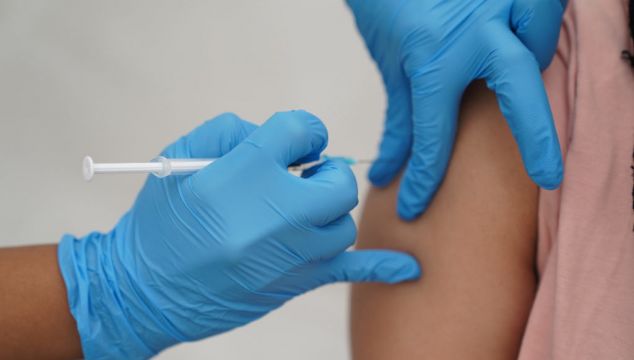Immunologist Professor Luke O’Neill, who has tested positive for Covid-19, has called for vulnerable people to be vaccinated or boosted as soon as possible.
Prof O’Neill said he will now be “quadruply” vaccinated, having had the booster on Thursday after his two-shot vaccine, and then testing positive for Covid at the weekend.
Speaking on Monday morning, he said vulnerable people, especially vulnerable children, should be vaccinated or boosted as soon as possible.
He also said boosters should be given to people who have had Covid.
“Now is the time to boost as many as possible” he told RTÉ’s Today with Claire Byrne.
At present people, who had Covid have been advised to wait for six months before getting the booster vaccine.
There was no doubt that the number of cases of the Omicron variant was rising, he said. It was three times more transmissible than previous variants.
An increase in cases in the UK will lead to a rise in cases here, he added.
He warned that, even if symptoms are milder, as research has indicated, there could still be a number of people who end up in hospital and that would put pressure on the health system.
However, it was still uncertain how strong the level of infection was , he said, which was why it was important for everyone to be boosted.
Prof O’Neill also repeated a call for the length of time from the second dose before the booster vaccine to be shortened from five months to three months. “That should be the rule now.”
Accelerated campaign
On the same programme Minister for Sport Jack Chambers said the HSE will present an accelerated booster campaign this week. He agreed that it was necessary to provide certainty to those over the age of 40 and to other cohorts on when they will receive their booster.
“We will be using every resource” to deliver the booster campaign, he said.
Meanwhile, Paul Moynagh, a professor of immunology at Maynooth University, said booster vaccines can protect the population from initial infection with the Covid-19 Omicron variant and delay infection levels from rising rapidly.
He added that given the limited capacity to roll out vaccines, younger children should be prioritised once older and vulnerable people have received their third dose.
Prof Moynagh said a booster campaign will “help to some degree” when fighting against variants of the virus.
“What a booster essentially does is to increase the amount of antibodies that you actually have because the antibodies protect against infection,” he said.
“But one of the other things that the booster does is it increases the repertoire or the diversity of antibodies that you produce so the antibodies have the potential to recognise even some variants that don’t currently exist.”
Antibodies
However, Prof Moynagh said attention would then have to turn to examining how long antibodies lasted.
“They tend to last for three to four months, we wait to see with the booster programme how long will these antibodies exist in our blood system,” he told RTÉ’s Morning Ireland.
“They tend to survive for only a few months anyway, they have to do that otherwise our blood would be full of antibodies from all the various microbes that we’re exposed to.”
On whether boosters or vaccines for children should be prioritised, Prof Moynagh said that depended on the end goal.

“Protecting the vulnerable is the right thing to do in terms of targeting of the booster programme initially, moving down the age groups,” he said.
“When we get into the younger age groups - even if they get exposed and infected with other variants they tend not to end up with serious illness so probably the best use of vaccines at the moment is to give it to people who have not been vaccinated.”
Prof Moynagh said if the objective is to reduce transmission, prioritising the vaccination of children is a good idea due to the high incidence of the virus in that age group.
“It’s not a situation where you’re going to be competing with vaccines, but in terms of the availability of resources to roll out, probably better initially to focus on children,” he added.







